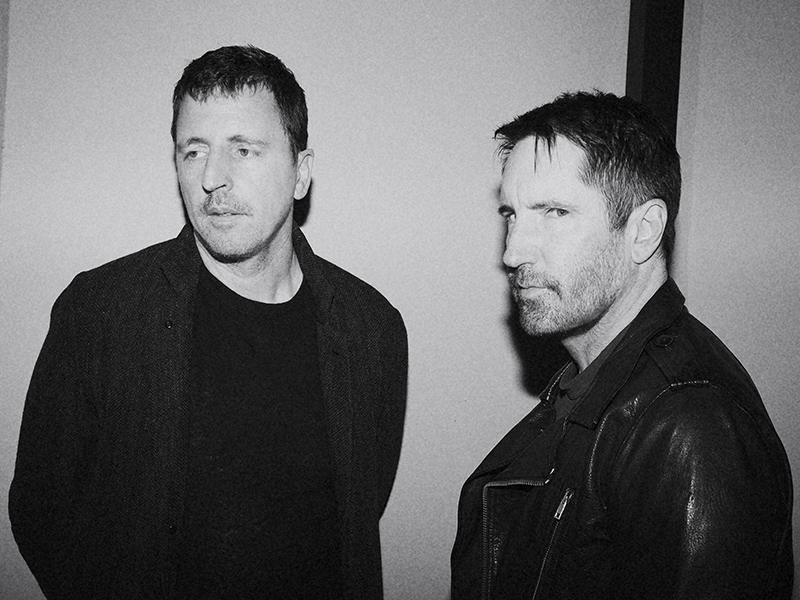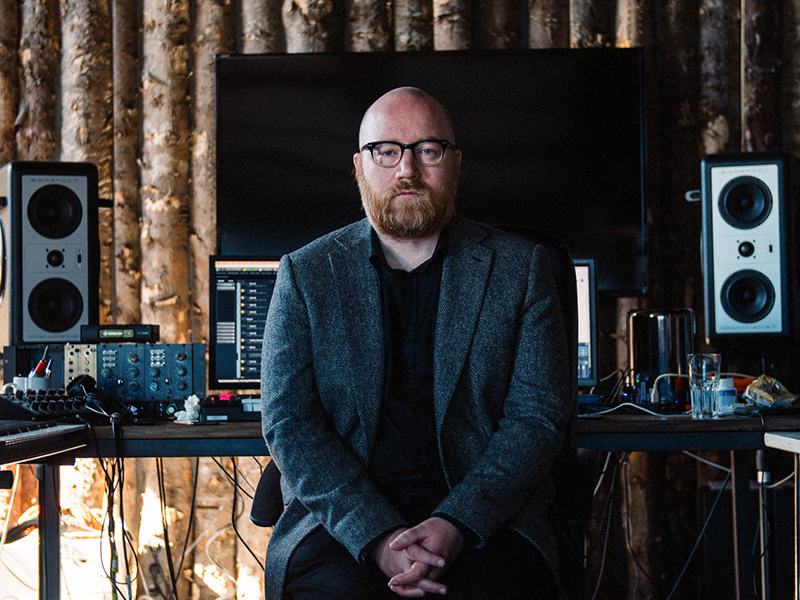What does the 21st century sound like in movies? Four contemporary film composers
Although the term film auteur generally applies to directors, and the soundtrack is seen as a simple artifice that accompanies and complements the picture, film music takes on more and more sophisticated mutations today – taking this notion at a totally another level compared to how movies used to be made in the past. Therefore, the examples below are not only so evocative and woven into the accompanying images, but most of the time it is enough to listen to them to “re-watch” the movies. And, thus, I avoided the already canonized composers (Hans Zimmer, John Williams, Philip Glass or Ennio Morricone – the list can continue endlessly), the result is a very subjective list of my current preferences.
In any case, film music of this kind disorients the viewer and hinders his immersion – enhancing the meaning of a scene or commenting on it in a singular way. Little Joe (dir. Jessica Hausner, composer Teiji Ito, frequent collaborator of Maya Deren) would be the latest example – here, a carnivorous plant “poisons” its victims with some kind of disease which makes them ultra protective of the plant. Without really knowing who is infected or not, a collective paranoia arises. If visually, the film is slow and aseptic, making private life, as well as the life of a botanist look like they’re both out of the lab, the soundtrack is full of barbarism (barking, drums, sound distortion), as if taken out of the troubled minds of the victims.
The topic on how few women are in this niche is still very actual (here and here, for example) – the problem is also related to the lack of equal chances, the fact that a woman can assert herself much harder than a man, and that she is given very few chances from the start – the first Oscar came in 1996, for Rachel Portman, with the soundtrack for Emma. I would love to believe that the coming years will be far more progressive (and, at the same time, Mica Levi is probably the most influential female contemporary film composer, Hildur Guðnadóttir was nominated for an Oscar for the original score of Joker, Lesley Barber is known for Manchester by the Sea, Tamar-klai for Mudbound), but it’s still quite unpredictable, just like the lottery. Only one name out of 1,000 composers is female.
- Atticus Rose & Trent Reznor – Gone Girl (dir. David Fincher)

Atticus Rose & Trent Reznor (aka Nine Inch Nails) use synthpop, heavy metal or industrial rock in their soundtracks (Girl with the Dragon Tattoo, The Social Network, both directed by David Fincher). Fincher’s genre films fit like a glove with Reznor and Rose’ experiments, at least seemingly so. In Gone Girl (the one that stands out the most, at least for me), the duo of composers / rock stars builds the saga of a relationship (from the beginning, where the piano is enchanting, then it accelerates, and by the end it completely goes rogue, with sound glitches and muffled noises). To summarize, the spider-web marriage between a cool girl and an ordinary guy was the hit of 2014: Amy (Rosamund Pike) disappears from home (or more precisely, stages her death, after several arguments between the two). If Fincher parodies in a way the social hypocrisy of couples who hide their demons under the rug, but simultaneously talks about men’s emasculation and the demonization of wives, Rose & Reznor boost the idea with a soundtrack that supports the thriller (along with meta inserts of “clues’” on the disappearance of his wife), and a tremolo that constantly oscillates between how things look like on the outside (a floating cloud, where all people are well-intentioned, as in the movie poster) and how they really are on the inside (a masquerade and a power play that reaches massive proportions).
- Jóhann Jóhannson – Arrival (dir. Denis Villeneuve)

Jóhannson died in 2018, leaving behind an eclectic film music, from avant-garde explorations (Mandy, Arrival), to classical compositions (The Theory of Everything). The only film directed by Jóhannson himself is Last and First Men, released posthumously in Berlin this year – a kind of monologue elegy, narrated by Tilda Swinton, on human mortality. Set in an unimaginable future (more than two billion years after the birth of Christ), following a cataclysm, the last people contemplate their own end – “a wreck of its own self”, says the narrator at one point. The images are austere and deserted, as a result of an impersonal take on scraps of buildings and bizarre geometric shapes – going in a continuous loop, like a radio transmission. Paradoxically, the music in the film is less monumental than most of what Jóhannson did before – and if in Arrival he was especially interested in reproducing new sounds and experimenting, in Last and First Men it’s as if he actually stayed on Earth, inspired by the sounds of nature.
The plot in Arrival is based on a very silent alien invasion: 12 oval ships levitate around the world and open their gates to human visitors; a linguist and a mathematician must learn to communicate with these beings in order to find their purpose on Earth. Although Villeneuve takes a step forward from the core of mainstream SF (he doesn’t humanize aliens, on the contrary, access to their universe is extremely low), what really elevates the film is Jóhannson’s fascinating music. Built as a counterpoint to Max Richter’s lamentatio (On the Nature of Daylight), which becomes in a way the theme of the protagonist’s fate, Jóhannson’s music is conceived as an alien altar, a tube through which one can look over our own yard. In order to create this effect, the composer uses the human voice, more precisely the Theater of Voices, a Danish ensemble – distorted and manipulated electronically, the voices sound as if they were communicating a tribal language.
- Jonny Greenwood – Phantom Thread (dir. Paul Thomas Anderson)

Jonny Greenwood, guitarist for the British band Radiohead, is a frequent collaborator of Paul Thomas Anderson and Lynne Ramsay – and has given the world the most self-conscious and postmodern musical compositions of the 21st century, from There Will be Blood (dir. Paul Thomas Anderson, 2007) to You Were Never Really Here (dir. Lynne Ramsay, 2017). My favorite, however, is Phantom Thread (dir. Paul Thomas Anderson, 2018), where, under the aegis of an apparent classicism, Greenwood combines monumentalism and romanticism.
Phantom Thread is a fairy tale where the beauty poisons the beast in order to tame it (or the story of a fashion designer who brings all sorts of muses to his altar of fine fabrics), and Jonny Greenwood’s music uses the tropes of musical Romanticism (Franz Schubert) and Impressionism (Claude Debussy). Unlike the disruptive experiments in The Master (Fandor comments on one of the most interesting pieces by Greenwood, where the composer integrates the haunting sound of the coconuts in the story into a polyphonic soundtrack), here he is more interested in textures. Therefore, in tandem with the preciousness of the dresses and their folds and the overwhelming silence that the protagonist’s creative routine demands, Greenwood idealizes this self-sufficient and high-class world – Woodcock, the protagonist, is fragile and frail, and the dresses he creates are lined with his own being, he leaves a piece of his soul in each of them, evoking the lost figure of his mother. The contrast between the majestic floral music that is the emblem of his fashion house and the tragic fragility of a man-child who wants to escape his curse on not being able to love is the key element in Greenwood’s compositions.
- Mica Levi – Under the Skin (dir. Jonathan Glazer)

Mica Levi (or Micachu, creator of the band Good Sad Happy Bad) is a film composer whose name became known relatively recently, with Under the Skin, in 2014. The story, as far as can be summarized, revolves around an unusual nymph, a contemporary predator (played by Scarlett Johansson), who crosses rural Scotland and gathers men in a van, talks to them, and then swallows them literally in a black hole, taking them out of the galaxy. The soundtrack consists of a sum of artificial sounds, meant to enhance its chaotic hunting. In a way, as Levi confesses, her music illustrates the way the creature casts its invisible scent over its victims, making them docile and easy to manipulate. The mystery around the origin of this alien species that chooses its prey at random is supported by the distorted, repetitive and obsessive music. Let’s listen, for example, to Creation, which sounds like a wheel that is going faster and faster, galloping in space, and the distortions of the cello sound like artificial sparks. A right comparison with this kind of music would be Gyorgi Lygeti (2001: A Space Odyssey) – however, Mica Levi’s musical compositions are based, in a way, on anti-musicality – the destruction of harmony between notes, the creation of artificial sounds (such as using a household vacuum cleaner).
Bonus: Levi’s musical composition for Jackie, Pablo Larraín’s 2016 film, is what gives the film real value – the loneliness and despair of Jackie Kennedy (played by Natalie Portman) sounds like a crystal ball breaking into a thousand pieces.
Journalist and film critic, with a master's degree in film critics. Collaborates with Scena9, Acoperișul de Sticlă, FILM and FILM Menu magazines. For Films in Frame, she brings the monthly top of films and writes the monthly editorial Panorama, published on a Thursday. In her spare time, she retires in the woods where she pictures other possible lives and flying foxes.
